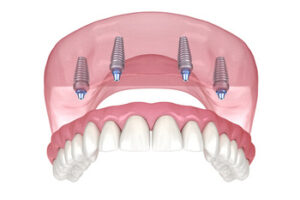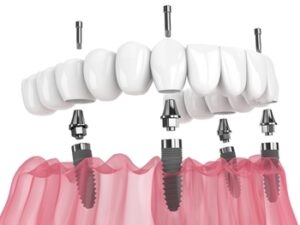Introduction
In Australia, the interest in full-mouth dental implants as a more permanent and effective replacement for missing teeth is growing. These implants offer an enduring alternative to conventional dentures and are implanted into the jaw bone to mimic the look and function of natural teeth. The treatment includes not just the implant itself but may involve bone grafting if your jaw bone isn’t ideal for implant placement.
The cost of this major dental treatment can fluctuate widely, depending on the number of implants, the type of materials used, the complexity of the dental implant procedures, and whether upper or lower teeth are being replaced. This guide dives deep into the intricate details affecting the cost of full-mouth dental implants in Australia. Whether you’re considering dental implant treatment or want to know more about the dental implant’s cost, this in-depth guide provides the essential information you need to make an informed decision for your dental well-being.
Why Opt for Full Mouth Dental Implants in Australia?
Investing in full-mouth dental implants is not merely a cosmetic endeavour. It’s a commitment to your comprehensive health and well-being. In Australia, where dental technology is advanced, the cost of full-mouth dental implants can be a considerable factor; however, the benefits far outweigh the costs.
Unlike temporary teeth solutions like tooth extractions or dental bridges, full-mouth implants offer a permanent and reliable fix for missing teeth. By choosing to undergo dental implant surgery, you’re opting for a procedure that mimics the natural structure of your teeth, including the tooth roots, enhancing both function and aesthetics.
Dental implant material usually comprises biocompatible substances like titanium, which reduces the likelihood of implant failure and facilitates a smooth dental implant placement. Moreover, whether your upper or lower teeth require treatment, full-mouth dental implants can be tailored to meet your specific oral health needs.
One of the major advantages of full-mouth dental implants over traditional options like complete dentures is their natural appearance. Made to match the colour and shape of your natural teeth, they offer a seamless transition and uplift your smile.
Dental implant costs can often be offset by dental health insurance benefits, making it an increasingly viable option for many Australians. Furthermore, bone grafting options are available for those lacking jaw bone density, which might add to the dental implant cost.
Full-mouth dental implants offer a holistic approach to treating missing or damaged teeth. Each step can be customised to fit your unique needs, from the surgical procedure to the final implant of retained dentures, making it a worthwhile investment in your long-term oral health.
Key Advantages:
- Lasting Durability: Made of materials such as titanium, these implants are designed to fuse with your lower jaw or upper jaw bone, providing long-term stability and outlasting the lifespan of typical dentures.
- Realistic Look and Feel: Dental implants replicate the natural appearance and functionality of your original teeth, reviving your smile and ability to eat normally.
- Jawbone Health: One of the less talked about yet significant benefits of dental implants is their role in preventing jawbone deterioration, often associated with missing teeth.
- Standard Care Requirements: These implants are virtually like your natural teeth regarding oral hygiene—simple brushing and flossing suffice.
- Boost in Confidence: A full set of solid teeth bolsters your self-assurance, dispelling any worries about missing tooth gaps or unstable dentures.
Dentures vs. Implants:
- Anchoring Security:
Dentures can slide around if they’re not an impeccable fit, whereas implants are securely fixed into your jawbone.
- Ease of Use: Dental implants offer a frictionless experience, greatly resembling natural teeth, while dentures may lead to discomfort around the gums.
- Food Choices: With dentures, certain foods are off the menu; implant wearers face no such restrictions.
- Natural Tooth Safety: Unlike dentures, which may require the modification of neighbouring teeth, dental implants offer a more tooth-conservative option.
- Long-term Cost: Though the immediate mouth dental implant cost can be higher, the benefits of reduced maintenance make it a cost-effective treatment in the long run.
Detailed Implant Procedure Overview
Step-by-Step Overview of Full-Mouth Dental Implant Placement
Opting for full-mouth dental implants is not just about aesthetics—it’s an investment in oral health and overall well-being. The journey begins with a thorough evaluation by a dental professional to create a treatment plan specific to your needs. Tooth extractions may be necessary for compromised teeth, and bone graft procedures may be carried out to prepare the jawbone for dental implant surgery.
Subsequently, a titanium post is anchored into the jawbone, initiating the osseointegration process. Over the coming months, this implant will integrate securely with the jawbone. An abutment is then attached to the implant, allowing for the placement of artificial teeth or other dental prosthetics.
Post-Operative Insights and Care
After the surgical procedure, patients often experience slight swelling and minimal bleeding, manageable with common analgesics. Diet restrictions are minimal, typically involving a transition to soft foods for a short period. Most patients return to their daily routines within a week, but periodic check-ups are crucial for tracking the implant’s successful integration.
Factoring in the cost of dental implant treatment, including any dental implant procedures and dental health insurance benefits you may have, the overall dental implant cost in Australia could provide long-term savings and benefits compared to alternatives like dental bridges or removable dentures.
Both versions offer a detailed perspective on what one can expect from the full-mouth dental implant process, making it easier for prospective patients to make an informed decision.
Factors Affecting the Cost of Full Mouth Dental Implants in Australia
Getting a full set of replacement teeth via full-mouth dental implants is a substantial investment, and several variables contribute to the overall dental implant cost. Here are some of the decisive elements:
- Implant Count: The number of missing teeth you want to replace directly correlates with the total cost—naturally, the more implants, the higher the expense.
- Type of Material: The dental implant material used, such as titanium or zirconia, has its cost implications. Zirconia is usually pricier than titanium.
- Surgical Complexity: Procedures that include additional steps like bone grafts to fortify the jaw bone can escalate the cost.
- Geographical and Economic Context: Dental procedures can cost more in cities than in smaller towns due to the cost of living and operational costs for dental practices.
Remember that insurance might not fully cover the procedure, so you should review your dental health insurance benefits. Planning the treatment with a qualified dentist can give you a clearer idea of the expected expenses and how they fit within your budget.
Both versions provide a comprehensive idea of the factors that could influence the full-mouth dental implant cost in Australia. They can help you prepare for the financial commitment associated with this important dental treatment.
Average Cost of Full Mouth Dental Implants
Understanding the likely costs is essential for those considering full-mouth dental implants as a solution for missing teeth. Here’s how the costs often break down:
- Initial Assessment:
This usually includes dental evaluations, X-rays, and creating a specialised treatment plan for the upper or lower jaw. You can expect to pay around $100 as a starting point.
- Implant Surgery: This segment makes up the lion’s share of the expenses, starting at approximately $15,000. The cost can escalate depending on the intricacy of the dental implant procedure, the choice of dental implant material, and the number of implants required.
- Aftercare: The post-surgery phase can pay an extra $1,000, covering subsequent consultations, prescriptions, and any required adjustments to ensure a natural appearance and optimal oral health.
Discussing your dental implant treatment plan with a qualified dental practice is advisable to get an accurate estimate tailored to your needs. Review your dental health insurance benefits, as insurance may cover some costs.
Both versions provide a comprehensive financial overview of what you might expect to pay for full-mouth dental implants in Australia. Remember that these are estimated figures, and costs can vary based on several factors.
Hidden Costs in Full Mouth Dental Implants Procedure in Australia
Besides the primary expenses for full-mouth dental implants, patients should also consider the following:
- Bone Augmentation: If there’s insufficient jaw bone to anchor the implants, additional bone grafting procedures could be necessary, increasing the dental implant costs.
- Tooth Removal: Any damaged or decayed natural teeth may have to be extracted before dental implant placement, which adds to the treatment costs.
- Anaesthesia and Sedation Costs: These costs can vary depending on the patient’s needs and the intricacy of the dental implant surgery.
- Recovery Items: Specific post-surgery essentials like medications and dressings for oral health can add extra charges.
How to Pay for Your Dental Implants
- Insurance Consultation: Discuss the extent of your coverage with your insurance company to see how much dental implant treatment they’ll cover.
- Payment and Financing Options: Dental practices often have flexible payment schemes or partnerships with external finance companies, helping to distribute the costs over an extended period.
Both versions aim to give you a well-rounded understanding of the total expenditure when considering full-mouth dental implants in Australia. Note that these are general estimates; you should consult an experienced dentist for a tailored treatment plan.
Technological Advancements in Dental Implants
Emerging technologies have significantly improved the accuracy and efficacy of dental implants, including full-mouth dental implants. Innovations like 3D imaging and CBCT scans offer unparalleled detail and precision, facilitating more effective treatment planning for even the most complicated dental problems.
Traditional methods like uncomfortable moulds for impressions have been supplanted by intraoral scanners, leading to increased comfort for patients. The benefits of these advancements include:
- A simulated plan of the entire dental implant treatment.
- Enabling precise implant placement in the upper and lower jaw.
- Lower associated risks and a boost in surgical benefits.
Improved Accuracy and Elevated Patient Experience
While technological improvements have enhanced the quality of dental implant procedures, they have also influenced the cost of dental implants in Australia. Investing in technology can translate to higher costs, but it usually also means quicker healing and fewer complications.
The price of full-mouth dental implants can fluctuate, particularly if additional treatments like bone grafts for the jaw bone are necessary. Engaging in treatment planning with your dentist and checking with your insurance provider to see how much of these more complex and high-cost dental procedures they will cover is essential.
Both versions provide insights into the technological advancements in dental implants and how they impact the cost and experience, especially in Australia. It’s always advisable to consult your nearest clinic for a tailored treatment plan.
Following a dental implant procedure, immediate aftercare is imperative. Patients should steer clear of the surgical area, avoiding activities like vigorous rinsing or spitting to minimise the risk of complications. To manage swelling during the first 24 hours post-surgery, cold compresses are effective when used in 20-minute intervals. Over-the-counter analgesics are generally sufficient for pain relief. Soft foods should be the primary dietary choice immediately after the surgery to reduce strain on the dental implant placement in the upper or lower jaw.
Aftercare and Maintenance of Dental Implants
Consistent dental check-ups and a robust daily oral hygiene routine are essential for the longevity of mouth dental implants. Daily brushing and flossing with non-abrasive toothpaste help maintain the implant’s natural appearance and function. Semi-annual professional cleanings and evaluations are necessary to ensure the dental implant treatment remains effective over the long term. Utilising a water flosser can be beneficial, particularly for cleaning hard-to-reach spaces. Avoiding certain behaviours like chewing on ice or pens can prevent potential harm to your implants.
Managing Risks in Dental Implant Procedures
Risks and Concerns Associated with Dental Implant Surgery
While dental implants have revolutionised the field of oral health by offering a durable and aesthetically pleasing solution to missing teeth, it is vital to remember that, like any surgical procedure, dental implant surgery carries certain risks and concerns. Being fully informed and prepared for the journey is essential, working closely with healthcare professionals to minimise potential complications and ensure the best possible outcome.
Infection at the surgical site remains a primary concern. If not addressed promptly, bacterial buildup can occur post-surgery and may require additional medical treatment, including antibiotics or surgical intervention. Meticulous oral hygiene and adhering to post-surgery guidelines can help mitigate this risk.
Damage to adjacent teeth and the jaw bone are also potential hazards. During the implant procedure, the surgical team must avoid affecting nearby natural teeth and the integrity of the jaw bone. The skill of an experienced dentist, aided by cutting-edge dental technology, can significantly reduce this risk, but it is a factor patients should be aware of.
Another concern is the body’s acceptance of the dental implant, known as osseointegration. While dental implants generally have a high success rate, failure can occur if the implant does not fuse adequately with the jaw bone. This can result from pre-existing medical conditions, inadequate jaw bone density, or insufficient post-operative care. In some instances, a bone grafting procedure may be necessary, carrying its own risks, such as graft rejection or infection.
Due to its well-documented biocompatibility, titanium is often the material of choice for dental implants. However, allergies to metals, including titanium, can pose complications. An allergic reaction can cause inflammation implant failure and necessitate implant removal. Therefore, patients should undergo comprehensive medical reviews, including allergy tests, before dental implant surgery.
To conclude, while dental implants offer a robust solution for missing teeth, it’s imperative to understand and prepare for the associated risks. A tailored treatment plan, developed in consultation with experienced healthcare providers, can ensure a successful and risk-minimised dental implant procedure.
How to Mitigate Risks

In conclusion, dental implants offer a robust solution for missing teeth, but understanding the associated risks and taking steps to mitigate them is crucial for long-term success. By entrusting your oral health to experts, you increase the odds of a smoother, more successful implant experience.
Conclusion
Opting for full-mouth dental implants is a substantial but worthy commitment that pays dividends in oral health and overall wellness. The manifold benefits span from rejuvenating your bite functionality to polishing your smile’s aesthetics. Such an essential life choice warrants expert guidance, and that’s where our proficient team at Dental 266 comes into play. We are poised to shepherd you through the implant process, tailoring our approach to your requirements with razor-sharp accuracy. With Dental 266, you’re in trusted hands for a dental transformation that’s customised to you. Take that pivotal first step by calling us at 02 9051 0600 scheduling your initial consultation with us now.
Note: Any surgical or invasive procedure carries risks. Before proceeding, you should seek a second opinion from an appropriately qualified health practitioner.
References:
Dental Implants. Part I: Biological basis, implant types, and the peri-implant sulcus https://pubmed.ncbi.nlm.nih.gov/8699485/
Dental implants and how crucial replacing teeth really is https://www.dentalhealth.org/Blog/dental-implants-and-how-crucial-replacing-teeth-really-is


 Dentures can slide around if they’re not an impeccable fit, whereas implants are securely fixed into your jawbone.
Dentures can slide around if they’re not an impeccable fit, whereas implants are securely fixed into your jawbone. This usually includes dental evaluations, X-rays, and creating a specialised treatment plan for the upper or lower jaw. You can expect to pay around $100 as a starting point.
This usually includes dental evaluations, X-rays, and creating a specialised treatment plan for the upper or lower jaw. You can expect to pay around $100 as a starting point.



